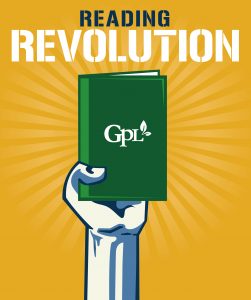Have you noticed that birthdays often make us reflective? And the bigger the number, the more reflective we get. We ask ourselves, “Have I accomplished enough? Seen enough? Am I where I thought I would be at this age?” It might surprise you to know that Libraries are reflective on their birthdays, too. We had a wonderful birthday party for our 100th in February with over 350 of you, and we’ve spent the year evaluating our accomplishments. As we reflect, we are especially proud to be healthy for our age. Because if you haven’t got your health . . . well, you know what they say. But still, we have so much more to accomplish.
We are grateful to be surrounded by a community that actively supports and invests in us, and that has a lot to do with the good health we enjoy. That investment, in fact, has been transformative. It is imperative to us that we let our supporters and investors know what their investment has the power to produce. And so today I’d like to tell you a little bit about what we hope to accomplish more than anything else – and that is to ignite a love of reading in our community.

Do you remember the first time you really “got into” a book? The first time the world around you disappeared and you found yourself in a world created by an author? Have you ever had a hard time putting down a book? Maybe you stole extra hours of reading under the covers with a flashlight when you were a kid, or maybe you’ve been a little groggy at work in the morning because you couldn’t put down that bestseller at 1:00 a.m.? Or maybe you are a non-fiction reader. Have you ever had an “aha” moment where you suddenly understood someth
ing in a completely new way? Books have the power to change our present and our future. But for all of us it started with just one book.
Do you remember being read to as a child? Or maybe you enjoy reading to your children or grandchildren? Sometimes, it is in those shared moments when that first book captures us and pulls us in. Do you remember what book it was that first caught you? Was it a fairy tale or picture book? Or maybe you remember the magic of classics like A Wrinkle in Time or The Lord of the Rings. In recent years scores of readers have been created through the magic of Harry Potter and his wizarding world.
My story is a little bit different. I was not much of a reader for most of elementary school. In addition to being what we later realized was dyslexic, I grew up in a fairly chaotic household during my mother’s battle against a cancer that would claim her life by the end of my fourth-grade year. It’s no surprise that my education was not a priority during those years. When my father remarried not quite a year later, it was to a widowed librarian. You’ve heard the saying “Hell hath no fury like a woman scorned”? Well you heard it wrong. The saying really goes like this: “Hell hath no fury like a librarian who believes a child’s literacy has been neglected.” I’d been passed along from grade to grade with no special help or remediation – they had simply chalked me up as not that bright. Enter the librarian. Within a month I was receiving pull-out reading help at school and my stepmom had launched her own personal battle plan. She began reading to me at bedtime. At 10 years old I was horrified. I am too old for this, I thought. But she just kept reading. Night after night, week after week. Soon the words became sentences became paragraphs became stories . . . became magic. And I was drawn in. Soon it was my favorite part of the day. And then I made a serious mistake. I leaned in. We were reading Chancey and the Grand Rascal by Syd Fleischman. Chancey, who had lost both of his parents, had saved his money for two years so that he could set off in search of his scattered siblings. With his worldly possessions in a wheelbarrow, he was just about to buy his steamboat ticket when he was swindled out of all of his money! How was he ever going to find his family? I desperately wanted another chapter that night. But of course this was the moment my Mom had been waiting for. She put in a bookmark and set the book down on the nightstand. “If you want to know what happens, you’ll have to finish it yourself.” What? It was awful. I was so angry. I swore I would NEVER finish that book. I think my ten-year-old outrage lasted an entire day before I broke down and struggled through the first book I ever finished on my own. And of course when I finished, my mom was there with the next book to read, and the next, and the next. By the end of fifth grade I was above average in reading for the first time in my life. By the end of sixth grade I tested at a twelfth-grade reading level. The moral of this story is, never mess with a librarian. This story took place a long time ago, over just a few months’ time, and yet this one moment, this one librarian, this one book changed my life.
Not everyone’s path to reading is smooth and straight. Without intervention, many children remain as I was before age 10 – functionally illiterate. They might with effort decode the words, but they can’t hear the story. And we know that children who are not reading well by fourth grade have a 78% chance of never catching up, and this can begin a very negative life story. Take a look at these statistics:
· 90% of welfare recipients are high school dropouts or functionally illiterate.
· 85% of juveniles who interface with the court system are functionally illiterate.
· 46% of American adults can’t read the labels on their prescription medication.
· 44 million adults in the U.S. can’t read well enough to read a simple story to a child.
· 70% of inmates at American prisons can’t read above a fourth-grade level.
On a global scale, one billion people in the world, or 1/7th of the world’s population are illiterate. If this were a physical disease or illness, it would be declared an epidemic and we would mobilize every resource to treat it. Unfortunately, this problem is not just global, but local. We cannot ignore the cost of illiteracy in our community. The U.S. Department of Justice stated, “The link between academic failure, delinquency, violence, and crime is welded to reading failure.”
Beyond the economic opportunities that literacy affords us, it also expands our understanding of what’s possible. Picture books help preschoolers understand that even though there are scary things in the world (and maybe under the bed), they can be brave. As we read we imagine ourselves as noble as the hero, as adventurous as the knight, and as powerful as the king. Indiana author John Green says, “We cannot go to a place that is not on our map of the possible.” Books give us this map.
When we read To Kill a Mockingbird, we meet Atticus Finch who teaches us to identify with someone who is different. When we read The Diary of Anne Frank, we hold our breath with her as she hides, and learn to be outraged at injustice and prejudice. When children read Wonder, they read about Auggie, born with a rare facial deformity, and they learn compassion. These stories affect and change us.
Those who founded GPL one hundred years ago were working to build a resilient and lasting community, and they believed so strongly that a library was an important part of that foundation that they labored for years to accomplish it. At that time free access to books and information was a huge part of the library’s role – and it still is.
Over the last century the pace of information has drastically accelerated, and now we not only provide books in many formats but high speed internet and other services as well. In the last 10 years, technology has offered us so many more ways to read, to learn, and to connect with each other, and yet literacy rates are not improving.
The rise of the smart phone and the proliferation of screens has made many things easier for us, but it is also impacting our habits and our connection with others in ways we don’t often stop to think about. Did you know that since smartphones have become prevalent, gum sales have gone down 25%? Why is that? Because our phones now fill every unoccupied moment in our lives which includes moments of grocery line boredom and reduce impulse buys. Since we are not in the gum business, this impact may seem trivial. But studies have shown some more disturbing trends that correlate to the rise of social media: lowered compassion, a rise in bullying, and a spread of the mob mentality. For readers and struggling readers alike, technology has offered more ways to read, but has also replaced reading with distraction, scrolling, and skimming. We are becoming a mile wide and an inch deep.
So what is our answer to the epidemic of illiteracy? The statistics above are certainly motivating. Fortunately, I know that GPL is not alone in this fight. Other libraries and schools are in it for the long haul. The teachers of our community are on the front lines, fighting against distraction and poverty to help children find the magic of stories. And since we know we are stronger together, we’ve spent our 101st year launching the Reading Revolution and partnering with our community to champion reading in our community – because the stakes are high.
Can you imagine what our community could be if Greenwood had the highest literacy rate in the state? If every child was ready to read by kindergarten? If we could turn the ship of those fourth graders who aren’t quite making it? The ones like me? What if more families of every economic strata read together and brought up a new generation of readers? If these things were true, then research tells us that we might begin to see greater empathy, higher test scores, a reduced incidence of Alzheimer’s, employees with greater focus and concentration, and a more civically and culturally involved community.
Our community’s support has already helped ignite this transformation and will continue to fuel it. More parents are reading to their children, more adults are talking about books and reading more widely. It’s been the goal of every library since before Carnegie, and we’re not stopping now. In fact, it’s more important to us than ever. And so I hope that tonight you’ll pick up that book you’ve been meaning to read, make time for bedtime stories, or log on for a new e-book to read. We hope you’ll join us in the revolution.

